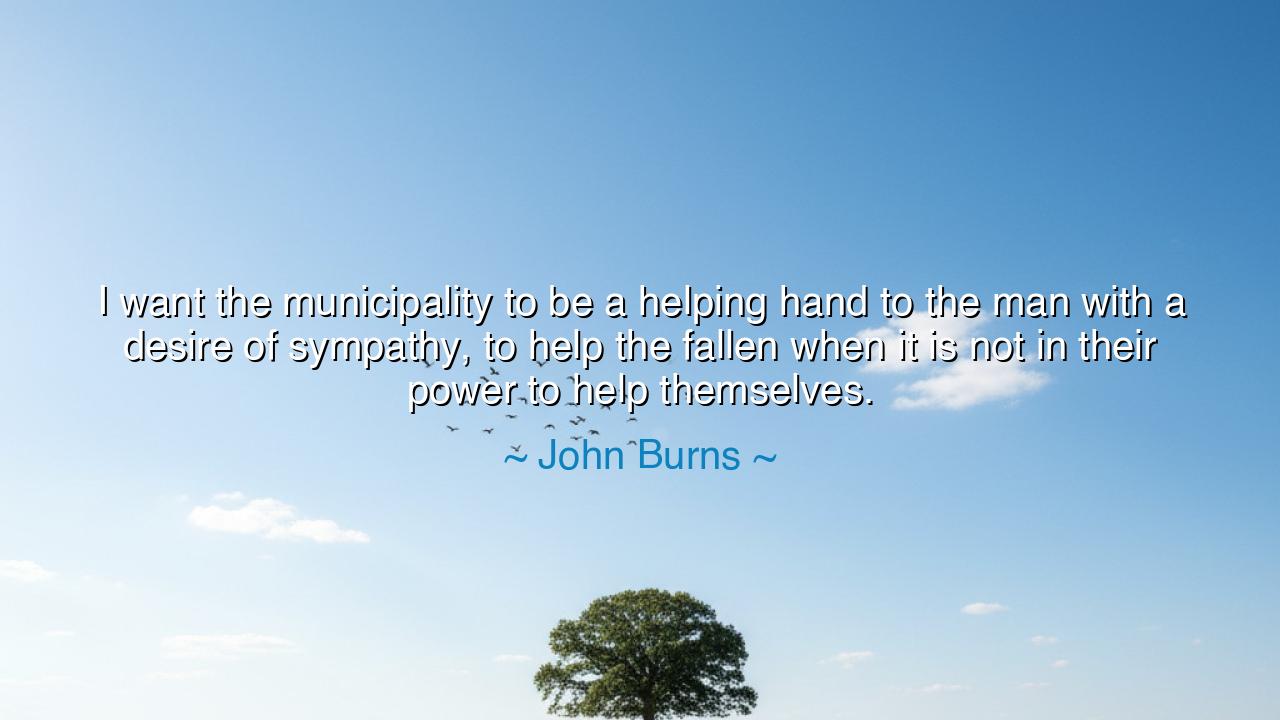
I want the municipality to be a helping hand to the man with a
I want the municipality to be a helping hand to the man with a desire of sympathy, to help the fallen when it is not in their power to help themselves.






In the annals of human civilization, the role of the municipality—the collective strength of society—has always been intertwined with the well-being of its people. John Burns, in his profound reflection, “I want the municipality to be a helping hand to the man with a desire of sympathy, to help the fallen when it is not in their power to help themselves,” speaks to the heart of community and compassion. These words remind us that a society's true strength lies not in its power or wealth, but in its ability to extend a hand to those in need, to provide solace, support, and guidance when an individual is unable to stand on their own. It is a call to recognize the shared humanity that binds us all, and the responsibility we have to one another in moments of weakness.
In the ancient world, this understanding of mutual aid and community responsibility was central to the foundation of Greek and Roman society. The Greeks, through their city-states, saw the role of the citizen as one of not only personal achievement but also collective service. In Athens, the concept of philanthropy and the duty to care for the less fortunate was woven into the fabric of civic life. Pericles, the great Athenian leader, famously spoke of a society where the welfare of every citizen was a shared concern, where wealth and power were meant to be used not for personal gain, but to uplift and support the common good. Similarly, in Rome, the concept of virtue was bound to one's actions toward others, especially the fallen or those in need. Roman emperors such as Trajan were known for their acts of charity, building public works and providing for the poor, ensuring that those who had fallen could still stand through the support of the state.
This spirit of sympathy and mutual support can be found in the biblical teachings of the Old Testament as well. In the Book of Leviticus, the Israelites were commanded to care for the poor, the widows, the orphans, and the foreigners—those who could not help themselves. These acts were not just seen as acts of charity, but as fundamental responsibilities that defined the moral and spiritual integrity of a community. In this ancient tradition, the municipality, or the community, was seen as a collective body that had a duty to care for those who were unable to care for themselves. Burns’ desire for a helping hand for the fallen echoes these ancient moral imperatives, reminding us that society’s true greatness is reflected in how it supports those who are in need, not just those who can offer something in return.
The notion of extending a hand to those who are fallen or in need is also deeply embedded in the stories of great heroes. The Greek myth of Hercules teaches that true strength is not in defeating one’s enemies, but in aiding those who are vulnerable. Hercules was not only known for his legendary labors, but also for his acts of mercy, such as when he helped the Titan Atlas, bearing the weight of the heavens to alleviate the burden of others. In this myth, Hercules embodies the essence of strength through compassion—the understanding that true greatness lies in the ability to support and uplift others. Similarly, John Burns encourages a society to view its greatness not through the size of its walls or wealth, but by the way it extends mercy and aid to the most vulnerable among its people.
Burns’ vision calls for social responsibility, where the power of the municipality is used to address the most pressing human concerns: not just justice, wealth, or conquest, but the basic human need for dignity, care, and sympathy. The falling that Burns speaks of is not necessarily a physical collapse, but the spiritual, emotional, and financial crises that every individual may face. In modern society, we often see this reflected in the struggles of the homeless, the mentally ill, or the underprivileged. Burns’ words remind us that no society can truly claim to be great unless it is willing to extend a helping hand to those in need, to assist the fallen, and offer a path back to dignity and hope.
The lesson here is clear: compassion and sympathy must be the foundation of any society that seeks to claim its place in history as just and virtuous. In our own lives, we are called not only to prosper and achieve personal success, but to look outward and offer support where we can. John Burns encourages us to look at the weakest and most vulnerable in our communities, not with pity, but with action—to offer the hand of support to those who are in need. Like the ancient heroes, we too must see our strength in the act of lifting others up, for true greatness lies not in what we have or what we accomplish, but in how we serve those who need us most.
In our own societies—whether in our personal lives, in our communities, or in our global connections—we must make it our duty to respond to the fallen with compassion. Let us look beyond indifference or self-interest, and be willing to offer that helping hand to those whose strength has failed. In doing so, we build a society that is just, merciful, and compassionate, embodying the highest ideals of both the ancients and the modern world. In this, we honor not only individuals but the very soul of our shared humanity.






AAdministratorAdministrator
Welcome, honored guests. Please leave a comment, we will respond soon